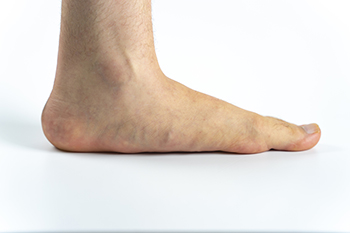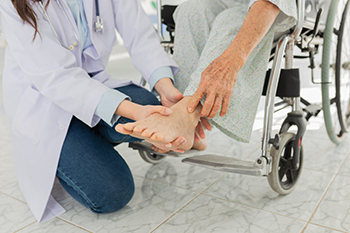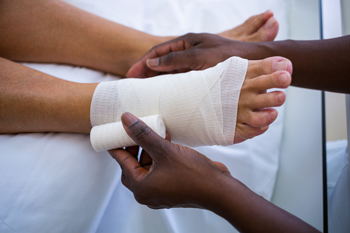September 2023
Early Intervention for Flat Feet

Children with flat feet do not always naturally outgrow this condition, contrary to what parents may be told. Research supports the belief that untreated flat feet can lead to long-term problems. While children may not experience foot pain due to their soft and forgiving bones, they may complain of leg, knee, and growing pains. When left untreated, flat feet can result in painful adult flat feet in the future. Early intervention is crucial to prevent these issues. Treatment options may include orthotics, strengthening exercises, ballet, and surgery if necessary. Monitoring a child's flat feet without intervention might lead to further complications and becoming unresponsive to treatment later. Recognizing the potential long-term consequences of untreated flat feet is essential for both foot health and overall body posture. Early intervention can help children develop the correct foot structure and prevent future problems. If you have a child with flat feet and want to learn more about early intervention, it is suggested that you make an appointment with a podiatrist for a consultation.
Flatfoot is a condition many people suffer from. If you have flat feet, contact Steven Spivak, DPM from Mount Holly Family Footcare. Our doctor will treat your foot and ankle needs.
What Are Flat Feet?
Flatfoot is a condition in which the arch of the foot is depressed and the sole of the foot is almost completely in contact with the ground. About 20-30% of the population generally has flat feet because their arches never formed during growth.
Conditions & Problems:
Having flat feet makes it difficult to run or walk because of the stress placed on the ankles.
Alignment – The general alignment of your legs can be disrupted, because the ankles move inward which can cause major discomfort.
Knees – If you have complications with your knees, flat feet can be a contributor to arthritis in that area.
Symptoms
- Pain around the heel or arch area
- Trouble standing on the tip toe
- Swelling around the inside of the ankle
- Flat look to one or both feet
- Having your shoes feel uneven when worn
Treatment
If you are experiencing pain and stress on the foot you may weaken the posterior tibial tendon, which runs around the inside of the ankle.
If you have any questions please feel free to contact our office located in Lumberton, NJ . We offer the newest diagnostic and treatment technologies for all your foot and ankle needs.
Essential Foot Care Tips for Seniors

As one ages, taking care of the feet becomes increasingly important. Neglecting foot health can lead to discomfort and mobility issues. There are several valuable foot care tips for seniors to ensure their feet remain in good condition. Maintaining proper hygiene can be accomplished by washing the feet daily, drying them thoroughly, and applying a moisturizer to prevent dry, cracked skin. Regularly inspect the feet for any cuts, sores, or changes in color, which may be signs of underlying issues like diabetes or circulatory problems. Select comfortable, well-fitting shoes that have ample arch support and cushioning to reduce the risk of foot pain and deformities. Keep your toenails trimmed straight across to prevent ingrown toenails. If you have difficulty reaching your feet, seek assistance from a family member or caregiver. It is beneficial to engage in foot exercises that can help to improve circulation and maintain flexibility. If you would like more information about foot care tips for elderly people, it is suggested that you speak with a podiatrist who can provide you with the knowledge you are seeking.
Proper foot care is something many older adults forget to consider. If you have any concerns about your feet and ankles, contact Steven Spivak, DPM from Mount Holly Family Footcare. Our doctor can provide the care you need to keep you pain-free and on your feet.
The Elderly and Their Feet
As we age we start to notice many changes in our body, but the elder population may not notice them right away. Medical conditions may prevent the elderly to take notice of their foot health right away. Poor vision is a lead contributor to not taking action for the elderly.
Common Conditions
- Neuropathy – can reduce feeling in the feet and can hide many life-threatening medical conditions.
- Reduced flexibility – prevents the ability of proper toenail trimming, and foot cleaning. If left untreated, it may lead to further medical issues.
- Foot sores – amongst the older population can be serious before they are discovered. Some of the problematic conditions they may face are:
- Gouging toenails affecting nearby toe
- Shoes that don’t fit properly
- Pressure sores
- Loss of circulation in legs & feet
- Edema & swelling of feet and ankles
Susceptible Infections
Diabetes and poor circulation can cause general loss of sensitivity over the years, turning a simple cut into a serious issue.
If you have any questions please feel free to contact our office located in Lumberton, NJ . We offer the newest diagnostic and treatment technologies for all your foot and ankle needs.
Benefits of In-Office Foot Surgery

In the field of podiatry, a significant shift has occurred over the past four decades. Initially, due to the challenges of obtaining hospital privileges, most podiatry surgeries were performed in-office. In-office surgery may seem unconventional to younger podiatrists, but it is an opportunity with benefits for both patients and doctors. With advancements in technology and cost-effective tools, in-office surgery offers practical solutions for common podiatric conditions. In addition to reducing costs, in-office surgery saves time, enhances patient convenience, and aligns with the changing landscape of healthcare. It is cost-effective and good for minimally invasive procedures. With local anesthesia and modern techniques, complications are minimal, and recovery is faster. While hospital-based surgery remains essential for certain cases, in-office surgery presents a valuable option for many podiatric procedures. Patients can have more immediate healing and cost savings, and podiatrists have an opportunity to diversify their practice and improve patient outcomes. If you need foot surgery, it is suggested that you make an appointment with a podiatrist to discuss whether they provide in-office procedures.
Foot surgery is sometimes necessary to treat a foot ailment. To learn more, contact Steven Spivak, DPM of Mount Holly Family Footcare. Our doctor will assist you with all of your foot and ankle needs.
When Is Surgery Necessary?
Foot and ankle surgery is generally reserved for cases in which less invasive, conservative procedures have failed to alleviate the problem. Some of the cases in which surgery may be necessary include:
- Removing foot deformities like bunions and bone spurs
- Severe arthritis that has caused bone issues
- Cosmetic reconstruction
What Types of Surgery Are There?
The type of surgery you receive will depend on the nature of the problem you have. Some of the possible surgeries include:
- Bunionectomy for painful bunions
- Surgical fusion for realignment of bones
- Neuropathy decompression surgery to treat nerve damage
Benefits of Surgery
Although surgery is usually a last resort, it can provide more complete pain relief compared to non-surgical methods and may allow you to finally resume full activity.
Surgical techniques have also become increasingly sophisticated. Techniques like endoscopic surgery allow for smaller incisions and faster recovery times.
If you have any questions please feel free to contact our office located in Lumberton, NJ . We offer the newest diagnostic and treatment technologies for all your foot and ankle needs.
Foot Infections and Wounds

There are many types of foot infections and they can be from a host of causes having to do with biomechanics of the feet and underlying health conditions. Patients with foot wounds often have diabetes, peripheral vascular disease, or other metabolic conditions. However, foot infections can also result from traumatic injuries or tissue loss, leading to contamination by foreign materials and bacteria formation. Over time, treatment approaches to foot infections have evolved, influenced by advancements in pharmacology and medical technology with the goal of preserving limbs. Plastic and reconstructive procedures have revolutionized the management of certain foot infections. The primary objectives now include restoring functionality and significantly reducing the need for amputations. These developments represent a promising shift in the management of foot infections, offering hope for improved outcomes in patients facing these challenging conditions. If you have a foot infection or wound, it is suggested that you make an appointment with a podiatrist as soon as possible to determine the cause of the wound and the best way to deal with it.
Wound care is an important part in dealing with diabetes. If you have diabetes and a foot wound or would like more information about wound care for diabetics, consult with Steven Spivak, DPM from Mount Holly Family Footcare. Our doctor will assess your condition and provide you with quality foot and ankle treatment.
What Is Wound Care?
Wound care is the practice of taking proper care of a wound. This can range from the smallest to the largest of wounds. While everyone can benefit from proper wound care, it is much more important for diabetics. Diabetics often suffer from poor blood circulation which causes wounds to heal much slower than they would in a non-diabetic.
What Is the Importance of Wound Care?
While it may not seem apparent with small ulcers on the foot, for diabetics, any size ulcer can become infected. Diabetics often also suffer from neuropathy, or nerve loss. This means they might not even feel when they have an ulcer on their foot. If the wound becomes severely infected, amputation may be necessary. Therefore, it is of the upmost importance to properly care for any and all foot wounds.
How to Care for Wounds
The best way to care for foot wounds is to prevent them. For diabetics, this means daily inspections of the feet for any signs of abnormalities or ulcers. It is also recommended to see a podiatrist several times a year for a foot inspection. If you do have an ulcer, run the wound under water to clear dirt from the wound; then apply antibiotic ointment to the wound and cover with a bandage. Bandages should be changed daily and keeping pressure off the wound is smart. It is advised to see a podiatrist, who can keep an eye on it.
If you have any questions, please feel free to contact our office located in Lumberton, NJ . We offer the newest diagnostic and treatment technologies for all your foot care needs.





